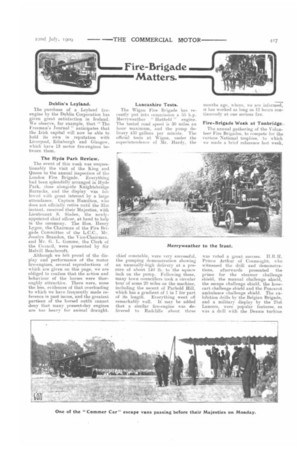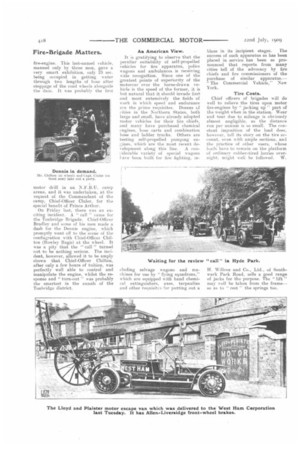Fire-Brigade Matters. im•—•7
Page 15

Page 16

If you've noticed an error in this article please click here to report it so we can fix it.
Dublin's Leyland.
The purchase of a Leyland fireengine by the Dublin Corporation has given great satisfaction in Ireland. We observe, for example, that " The Freeman's Journal " anticipates that the Irish capital will now be able to bold its own in reputation with Liverpool, Edinburgh and Glasgow, which have 13 motor fire-engines between them.
The Hyde Park Review.
The event of this week was unquestionably the visit of the King and Queen to the annual inspection of the London Fire Brigade. Everything had been splendidly arranged in Hyde Park, close alongside Knightsbridge Barracks, and the display was followed %%Ali great interest by a large attendance. Captain Hamilton, who does not officially retire until the 31st instant,, received their Majesties, with Lieutenant S. Sladen, the newlyappointed chief officer, at hand to help in the ceremony. The Hon. Henry Lygon, the Chairman of the Fire Brigade Committee of the L.C.C., Mr. Jocelyn Brandon, the Vice-Chairman, and Mr. G. L. Gomme, the Clerk of the Council, were presented by Sir Melvin Beachcroft.
Although we felt proud of the display and performance of the motor fire-engines, several reproductions of which are given on this page, we are obliged to confess that, the action and behaviour of the horses were thoroughly attractive. There were, none the less, evidences of that overloading to which we have frequently made reference in past issues, and the greatest partisan of the horsed outfit cannot deny that many present-day engines are too heavy for animal draught. Lancashire Tests.
The Wigan Fire Brigade has recently put into commission a 55 h.p. Merryweather " Hatfield " engine. The tested road speed is 30 miles an hour maximum, and the pump delivery 450 gallons per minute. Tile official tests at Wigan, under the superintendence of Mr. Hardy, the chief constable, were very successful, the pumping demonstration showing an unusually-high delivery at a presure of about 140 lb. to the square inch on the pump. Following these, many town councillors took a circular tour of some 20 miles on the machine, including the ascent of Parbold which has a gradient of 1 in 7 for part of its length. Everything went off remarkably well. It may be added that a similar fire-engine was delivered to Radcliffe about three months ago where, we are informed, it has worked as long as 12 hours continuously at one serious fire.
Fire-Brigade Week at Tossbridge The annual gathering of the Volunteer Fire Brigades, to compete for the various National trophies, to which we made a brief reference last week, was voted a great success. II.13.1-1. Prince Arthur of Connaught, who witnessed the drill and demonstrations, afterwards presented the prizes for the steamer challenge shield, the manual challenge shield, the escape challenge shield, the hosecart challenge shield and the Poncerot ambulance challenge shield. The ex-. hibition drills by the Belgian Brigade, and a military display by the 21st. Lancers, were popular features, as. was a drill with the Dennis turbine fire-engine. This last-named vehicle, manned only by three men, gave a very smart exhibition, only 2$ sec. being occupied in getting water through two lengths of hose after stoppage of the road wheels alongside the dam. It was probably the first motor drill in an N.F.B.U. camp arena, and it was undertaken, at the request of the Commandant of the camp, Chief-Officer Mier, for the special benefit of Prince Arthur.
On Friday last, there was an exciting incident. A " call " came for the Tonbridge Brigade. Chief-Officer Bradley and some of his men made a .dash for the Dennis engine, which promptly went off to the scene of the conflagration with Chief-Officer Chilton (Rowley Regis) at the wheel. It was a pity that the "call " turned out to be nothing serious. The incident, however, allowed it to be amply shown that Chief-Officer Chilton, -after only a few hours of tuition, was perfectly well able to control and manipulate the engine, whilst the response and " turn-out " was probably the smartest in the annals of the Tonbridge district. An American View. •
It is gratifying to observe that the peculiar suitability of self-propelled vehicles for fire apparatus, police wagons and ambulances is receiving wide recognition. Since one of the greatest points of superiority of the motorcar over the horse-drawn vehicle is the speed of the former, it is but natural that it should invade first and most extensively the fields of work in which speed and endurance are the prime requisites. Dozens of cities in the Northern States, both large and small, have already adopted motor vehicles for their fire chiefs, and many have purchased chemical engines, hose carts and combination hose and ladder trucks. Others are testing self-propelled pumping engines, which are the most recent development along this line. A con:;iderable variety of special wagons have been built for fire fighting, in
chiding salvage wagons and machines for use by " flying squadrons," which are equipped with hand chemical extinguishers, axes, tarpaulins and other requisites for putting out a blaze in its incipient stages. The success of such apparatus as has been placed in service has been so pronounced that reports from many cities tell of the advocacy by fire chiefs and fire commissioners of the purchase of similar apparatus.— " The Commercial Vehicle," New York.
Tire Costs.
Chief officers of brigades will do well to relieve -the tires upon motor fire-engines by "jacking up " part of the weight when in the station. Wear and tear due to mileage is obviously almost negligible; as the distance run per annum is so small. The constant imposition of the load does, however, tell its story on the tire account, even with ample sections, and the practice of other users, whose loads have to remain on the platform of ordinary rubber-tired lorries overnight, might well be followed. W.
H. Willcox and Co., Ltd., of Southwark Park Road, sells a good range of jacks for the purpose. The " lift " may well be taken from the frame— so as to " rest the springs too.






















